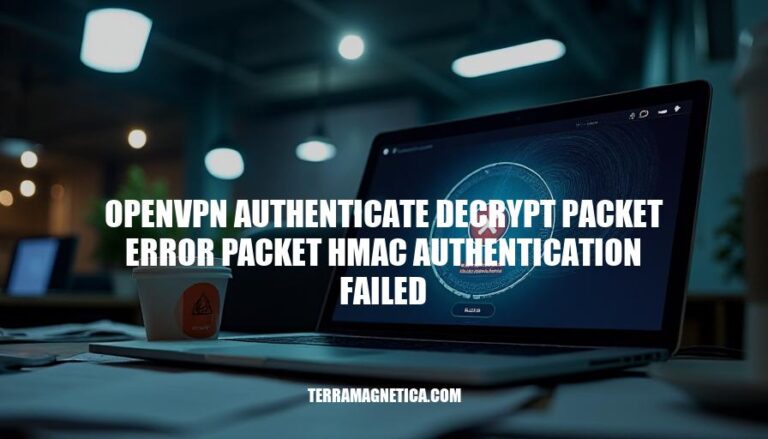


The issue of “OpenVPN authenticate decrypt packet error packet HMAC authentication failed” is a common problem encountered when setting up OpenVPN servers. This error typically occurs due to misconfigurations, such as improperly generated or installed ta.key files, or inconsistencies in authentication standards and cipher configurations.
Ensuring secure communication is paramount in today’s digital age, and OpenVPN plays a crucial role in providing secure VPN connections. When this error occurs, it compromises the integrity and security of the data being transmitted, making it essential to address and resolve the issue promptly.
Proper configuration and key management are vital to maintaining the security and reliability of OpenVPN connections.
The ‘authenticate/decrypt packet error: packet HMAC authentication failed’ issue in OpenVPN occurs when the HMAC (Hash-based Message Authentication Code) verification fails. HMAC is a cryptographic technique used to verify both the data integrity and authenticity of a message. It involves combining a secret key with the message/data using a hash function to produce a unique MAC (Message Authentication Code).
In the context of OpenVPN, HMAC authentication is used to ensure that the packets exchanged between the client and server have not been tampered with and are from a legitimate source.
The server and client share a secret key, which is used to generate and verify the HMAC. If the HMAC verification fails, it means that the packet’s integrity or authenticity is compromised, leading to the error.
Common causes of this error include:
Improperly generated or installed ta.key in the configuration file.
Mismatched versions of the OpenVPN server and client.
Incorrect network firewall or security settings.
To resolve this issue, you can:
Ensure the ta.key is properly generated and correctly placed in the configuration file.
Update both the OpenVPN server and client to compatible versions.
Check and adjust network firewall and security settings to allow proper communication.
By addressing these factors, you can fix the HMAC authentication failure and ensure secure communication between the OpenVPN client and server.
Incorrect shared secret keys or mismatched configurations are common causes of the ‘openvpn authenticate decrypt packet error packet hmac authentication failed’ error. When the shared secret keys used for HMAC authentication do not match between the client and server, packet authentication fails. Similarly, if there are configuration mismatches, such as incorrect paths to key files or different TLS versions, the error can occur.
Additionally, improperly generated or installed ta.key files in the configuration can lead to this issue. Ensuring that both ends of the connection have matching and correctly configured keys and settings is crucial to resolving this error.
Check Key Files: Ensure that the ta.key file is properly generated and correctly placed in both the server and client configuration files. Use the command openvpn --genkey secret ta.key to generate the key.
Verify Configuration Consistency: Confirm that the tls-auth option is enabled in both the server and client configuration files. Ensure that the paths to the ta.key file are correctly specified in both configurations.
Ensure Compatibility: Verify that both the server and client are using compatible versions of OpenVPN.
Mismatched versions can cause authentication errors.
Restart Devices: Sometimes, simply restarting the server and client devices can resolve transient issues.
Check Logs: Review the OpenVPN logs on both the server and client for any additional error messages that might provide more insight into the issue.
Disable tls-auth (if necessary): If the above steps do not resolve the issue, try temporarily disabling the tls-auth option in the configuration files to see if the error persists. If the error goes away, re-enable tls-auth and double-check the key files and configurations.
Consult Documentation: Refer to the official OpenVPN documentation for any additional troubleshooting steps or configuration tips.
Seek Support: If the issue persists, consider reaching out to the OpenVPN community or support forums for further assistance.
Regular Updates: Ensure that both the OpenVPN server and client software are always up-to-date to benefit from the latest security patches and bug fixes.
Proper Configuration Management: Maintain accurate and consistent configuration files across all devices. Double-check that the tls-auth and tls-crypt settings are correctly implemented.
Generate Keys Properly: Use the openvpn --genkey secret ta.key command to generate the ta.key file correctly.
Restart Devices: Sometimes, simply restarting the OpenVPN server and client devices can resolve transient issues.
Check for Inconsistencies: Ensure there are no inconsistencies in the link-mtu and comp-lzo settings between the server and client configurations.
Use Strong Ciphers: Utilize strong ciphers like AES-256-GCM to enhance security and reduce the likelihood of errors.
Monitor Logs: Regularly monitor OpenVPN logs for any unusual activity or errors that could indicate configuration issues or potential attacks.
Network Configuration: Verify that network settings such as firewall rules and routing configurations are correctly set up to allow OpenVPN traffic.
Client Configuration: Ensure that the client configuration files are correctly set up and match the server settings, especially regarding authentication methods.
TLS Version: Make sure that the TLS version used is compatible with both the server and client to avoid handshake failures.
By following these measures, you can help prevent the “Authenticate/Decrypt packet error: packet HMAC authentication failed” issue in the future.
The ‘authenticate/decrypt packet error: packet HMAC authentication failed’ issue in OpenVPN occurs when the HMAC verification fails, compromising data integrity and authenticity.
To resolve this issue, ensure proper configuration and key management by:
Regular updates, proper configuration management, generating keys properly, restarting devices, checking for inconsistencies, using strong ciphers, monitoring logs, network configuration, client configuration, and TLS version are also crucial in preventing this issue.
Resolving this error is essential for maintaining secure VPN connections.